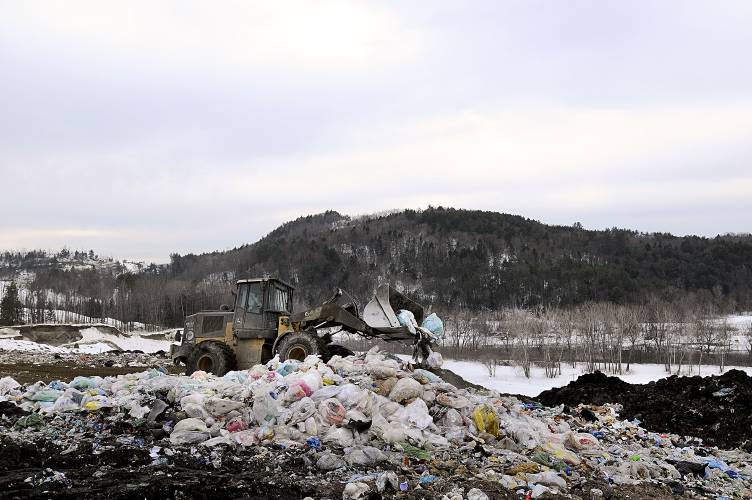Lebanon landfill has new recycling programs and will change payment system

A loader moves recently dumped garbage at the landfill in West Lebanon, N.H., on Feb. 16, 2011. (Valley News - Jason Johns) Copyright Valley News. May not be reprinted or used online without permission. Send requests to permission@vnews.com. Valley News file
| Published: 08-21-2023 3:05 AM |
LEBANON — Long considered one of the more environmentally progressive solid waste facilities in New Hampshire, the municipal landfill on Route 12A is launching a number of new waste diversion programs this summer and changing the way residential users pay to dump their trash.
Since the end of July, the landfill has accepted plastic grocery bags for recycling. The landfill gathers the single-use symbols of human pollution, and its partner Trex, a Virginia-based company, retrieves them and turns them into a decking materials that are an alternative to wood.
In addition to grocery bags, the plastics accepted at the landfill also include produce bags, newspaper sleeves, cereal box liners and bubble wrap.
“The test is: If you can stick your finger in it and the plastic stretches, they’ll take it,” said Erica Douglas, Lebanon’s solid waste manager.
The landfill just asks that the plastic is brought in clean and dry.
The solid waste facility has also made permanent its textile recycling initiative. Around 85% of all textiles — clothes and other fabrics — thrown away in the U.S. wind up in landfills, according to the federal Environmental Protection Agency. The landfill partnered with another recycling organization, Apparel Impact, based in Hooksett, N.H,, that recovers and redistributes useable clothing across New England.
“They even take accessories, shoes, belts, towels, bedding, linens,” Douglas said.
While textiles may seem innocuous, some fabrics — especially those with water-resistant properties — contain perfluoroalkyl and polyfluoroalkyl substances, better known as PFAS, or “forever chemicals.” The substances are widespread and are linked by several studies to serious health effects, including cancers, liver damage and childhood developmental issues. They are only just recently facing proposed regulations at the federal level.
Article continues after...
Yesterday's Most Read Articles
 Stolen White River Junction weathervane returns after 40 years
Stolen White River Junction weathervane returns after 40 years
 Enfield Zoning Board approves variances for 300-unit development
Enfield Zoning Board approves variances for 300-unit development
 Beilock’s leadership divides students; ‘no confidence’ narrowly passes
Beilock’s leadership divides students; ‘no confidence’ narrowly passes
 Homeless Upper Valley couple faces ‘a very tough situation’
Homeless Upper Valley couple faces ‘a very tough situation’
“Anything that could be a contaminant we’re trying to keep out of the landfill,” Douglas said. “We’ve already (kept) out several tons of clothing.”
In addition to the recycling programs, the Lebanon facility, which is open to residents in nearly two dozen Upper Valley towns, also is changing the way users pay to dump their garbage. Punch cards will be largely phased out by the end of the year.
Beginning earlier this month, pre-paid trash bags have been available for purchase at Upper Valley grocery stores, including Price Chopper and Co-op stores. Douglas is hopeful the bags will be available in Shaw’s and Hannaford soon. They are sold in 15-gallon and 30-gallon sizes. They are $10 for each roll, which include 10 bags in the smaller size and five bags in the larger size.
For now the bags are optional, but starting Jan. 1 it will be mandatory for landfill users who are not Lebanon residents.
Disposal fees are priced into the cost of the bags, so punch cards will no longer be necessary. Instead, residents of all authorized communities need an updated permit, which will be available for sale online on Sept. 1.
A complete list of eligible municipalities and information about how to obtain an updated disposal permit can be found at this link: https://lebanonnh.gov/1514/Solid-Waste-Permits.
“We’ve been giving out free samples so people can get used to them,” Douglas said. “It makes it easier for our staff. ... They get their permit scanned, no punch cards. Everyone just gets their bags and goes.”
The goal of the prepaid bags is to reduce how much landfill users are throwing away.
“People are more thoughtful about what they’re throwing out when they have to buy a bag,” Douglas said.
In 2009, Concord implemented a similar pay-as-you-throw program, and solid waste disposal was cut by more than 40%.
Any waste diversion is good for extending the life of the landfill. The city is in the process of permitting the third phase of expansion at the facility, as it keeps pace with the region’s ever-growing demand for waste disposal.
And the waste that does end up in buried at the landfill will soon be put to a greater purpose. After nearly a decade and a half of planning, construction of the Lebanon Gas-To-Energy Project is expected to begin in the spring, Douglas said.
The technology converts methane gas emitted from the landfill into electricity. It is expected to reduce greenhouse gas emissions by an estimated 3,500 tons each year, according to previous reporting.
For the city’s environmentally minded residents, like Sherry Boschert, a member of the city’s Energy Advisory Council, the landfill is no odorous eye-sore. It is a place of possibility.
“It’s just such a resource and opportunity,” Boschert said.
Nearby municipalities in New Hampshire and Vermont can utilize the Lebanon’s solid waste facility. Starting Jan. 1, landfill users from all communities will be required to use updated permits. Applications for the updated permit will be available on the city’s website beginning Sept. 1.
Frances Mize is a Report for America corps member. She can be reached at fmize@vnews.com or 603-727-3242.

 Town Meeting: Hanover approves Gaza cease-fire resolution
Town Meeting: Hanover approves Gaza cease-fire resolution Town Meeting: Newport rejects proposed $11.5 million operating budget
Town Meeting: Newport rejects proposed $11.5 million operating budget UNH Faculty Senate calls on university to investigate police response to protest
UNH Faculty Senate calls on university to investigate police response to protest
